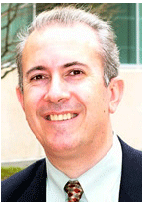Richardson, Texas (March 30, 2006) — Dr. Philip C. Loizou, an electrical engineering professor in the Erik Jonsson School of Engineering and Computer Science at the University of Texas at Dallas (UTD), has been awarded a three-year, $1.3-million contract from The National Institutes of Health (NIH) to build an interface that will enable personal digital assistants, or PDAs, to transmit sounds to an implant worn in the inner ear of deaf individuals.
 "This will no doubt have a profound impact on the life of hearing impaired people," Loizou said. "To them, this PDA processor could not only be a speech processor, but a PC, a phone, an assistive listening device, a GPS device, an Internet browser and a music player — all integrated into one device."
"This will no doubt have a profound impact on the life of hearing impaired people," Loizou said. "To them, this PDA processor could not only be a speech processor, but a PC, a phone, an assistive listening device, a GPS device, an Internet browser and a music player — all integrated into one device."The National Institutes of Health awarded Dr. Philip C. Loizou a $1.3-million contract to build an interface that will enable personal digital assistants to transmit sounds to an implant worn in the inner ear of deaf individuals.PDAs have grown in popularity as personal data organizers, Web browsers, cell phones and music players. Loizou, who directs both the Cochlear Implant Laboratory and the Speech Processing Lab at UTD, said the new interface he hopes to develop will allow PDAs to process acoustic signals — such as speech — through a microphone that is worn behind an individual's ear. The signal would then be transmitted wirelessly into a cochlear implant in the inner ear.
According to Loizou, technology currently exists to transmit sounds to cochlear implant users, but it is costly and relies on custom-made speech processors. Replacing the speech processors with PDAs will make the technology more affordable, and the flexibility of PDAs will make the technology more accessible.
"The goal is to develop the PDA as a research processor that is portable, flexible and easy to use, and make it available to researchers interested in clinical studies," Loizou added. "Open access to such a PDA processor could accelerate the research at a faster pace. PDAs provide powerful computing ability and have excellent wireless connectivity options, and this will make cochlear implant technology accessible to all, including the hearing impaired population in Third-World countries."
The team that will work on the project draws from several areas of expertise and includes four faculty members from UTD's electrical engineering department, including Dr. Hoi Lee, Dr. Murat Torlak, Dr. Nasser Kehrtarnavaz and Loizou. Dr. Anu Sharma, who also will collaborate on the project, is from UTD's School of Behavioral and Brain Sciences and has extensive clinical experience in neurophysiology.
This is the second NIH award Loizou has earned. The first, which he received in March 2005, was a five-year, $1.5-million grant to improve the performance of cochlear implants by programming the prosthesis to operate more effectively in a range of listening conditions.
Loizou joined UTD in 1999. He earned his B.S., M.S. and Ph.D. degrees in engineering from Arizona State University.
About UTD
The University of Texas at Dallas, located at the convergence of Richardson, Plano and Dallas in the heart of the complex of major multinational technology corporations known as the Telecom Corridor®, enrolls nearly 14,500 students. The school's freshman class traditionally stands at the forefront of Texas state universities in terms of average SAT scores. The university offers a broad assortment of bachelor's, master's and doctoral degree programs. For additional information about UTD, please visit the university's web site at www.utdallas.edu.
Taken from https://www.utdallas.edu/news/archive/2006/pda-interface.html

